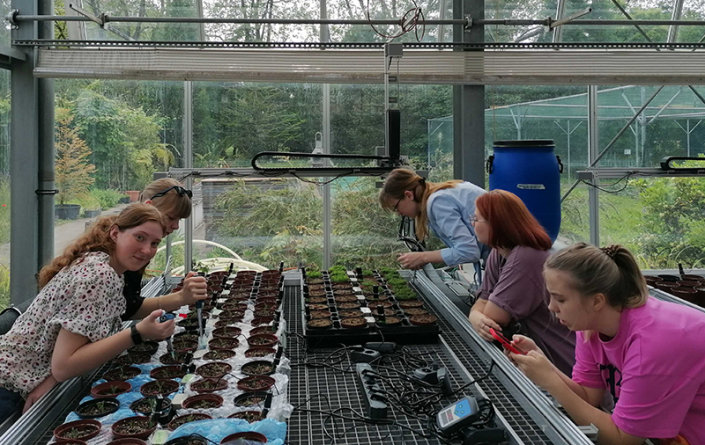Observing how plants adapt to climate change
TH Köln and the University of Cologne test sensor technology for an experimental platform
Climate change also influences plant growth and soil biodiversity. To determine these effects in detail, researchers from TH Köln – University of Applied Sciences and the University of Cologne have, together with students, developed a technical solution for conducting experiments and presenting the results by a visualistion software. Once the project has been completed, the software will be freely available as an open educational resource (OER) and can, for example, be used for teaching.
More information
The platform featuring information about the experiments (in German only) is freely accessible:
As Prof. Marcel Bucher from the Institute of Plant Sciences at the University of Cologne explains: “The approach we took together was to illustrate the effects of drought and flooding on plant growth and biodiversity. Through problem-orientated learning, we taught the students the interrelationships so that they could plan and carry out experiments themselves. There was also an interdisciplinary exchange between students from the Biology and Engineering faculties.”
 (Image: Isabelle Metzen/Universität zu Köln)
(Image: Isabelle Metzen/Universität zu Köln)
At a joint test station in a greenhouse at the University of Cologne, a robot, a so-called ‘farmbot’, watered 144 plant pots every four hours. The plants were subjected to stress by being given too little or too much water, after which their response was documented. The TH Köln team developed the sensor technology to provide the right amount of water.
Record climate parameters and optimise irrigation
“First and foremost, we recorded the temperature and soil moisture, as well as air humidity and air pressure. The data was then transferred to servers, analysed and finally presented on the platform in visual form,” reports Prof. Uwe Dettmar from the Institute of Computer and Communication Technology at TH Köln. A reader installed on the farmbot scans a tag that identifies plant pots clearly, ensuring that each one receives the right amount of water. “Our watering system, which is installed on the robot, is able to dose water right down to the last millilitre, which allowed us to optimise our watering strategy,” Dettmar continues.
Involvement of Ukrainian students
Parallel to setting up the platform, the project team established hands-on learning modules. Here, students came up with their own concepts on how to investigate the adaptation of plants to climate change and conducted related experiments. A total of four series of tests were carried out. Students from Ukraine were also involved in the project. “We used existing contacts to lecturers to organise the participation of guests from four Ukrainian universities in the projects. Having online tools proved to be very useful as young men were not allowed to leave the country because of the ongoing war. Nonetheless, some of them were able to take part in courses online. Around ten female students spent a period of time working on location in Cologne,” explains Dettmar.
Press release 14/2024
March 5th, 2024
About the project
The research project ‘InnoBioDiv – Innovation platform for education and research on the influence of climate change on plant growth and soil biodiversity’ was headed by Prof. Uwe Dettmar from the Institute of Computer and Communication Technology at TH Köln and Prof. Marcel Bucher from the Institute for Plant Sciences at the University of Cologne. The experiments built on the research findings of CEPLAS (Cluster of Excellence on Plant Sciences), another project partner. The approved experimental platform is part of the innovation platform that collects ecological relationships, concepts and ideas for making plants and biotopes more resilient to climate change. The BMUV provided the project with funding to the total value of €200,000 over a period of two years.
March 2024

